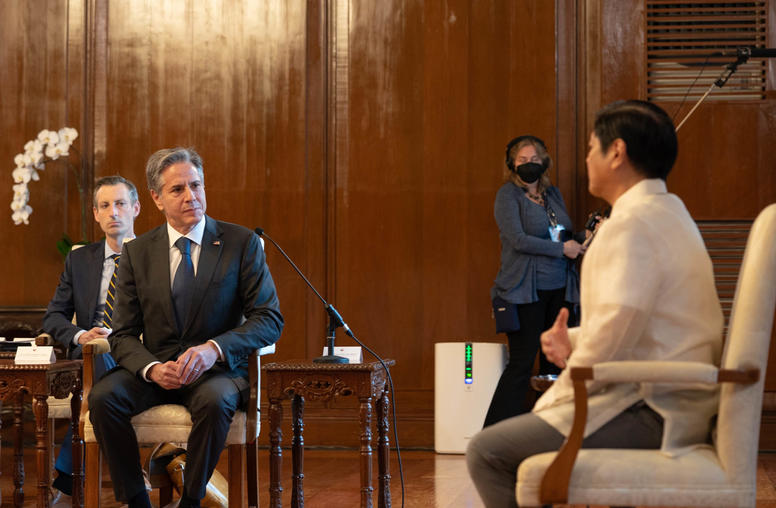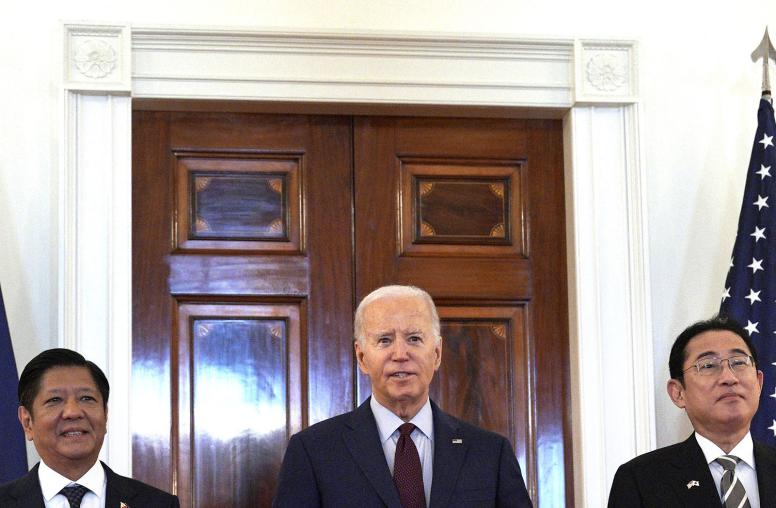Publications
Articles, publications, books, tools and multimedia features from the U.S. Institute of Peace provide the latest news, analysis, research findings, practitioner guides and reports, all related to the conflict zones and issues that are at the center of the Institute’s work to prevent and reduce violent conflict.
Question And Answer
Blinken’s China Trip Shows Both Sides Want to Stabilize Ties

Bangsamoro Peace and the U.S.-Philippines Alliance
The election in May of Ferdinand Marcos Jr. as the 17th president of the Philippines presents an opportunity to reset U.S.-Philippines relations after six rocky years while President Rodrigo Duterte held the office. After Marcos’s sweeping election victory, President Biden called to congratulate him and then dispatched a series of U.S. officials to Manila, including Secretary of State Antony Blinken. Any concerns that the Marcos family’s corruption and lingering legal issues in the United States would hold up relations have been pushed aside due to the enormous interests the United States has in a functioning U.S.-Philippines alliance.

China Forces Myanmar Scam Syndicates to Move to Thai Border
While Myanmar has long been the chief venue for the criminal operations of Chinese-origin gangs in Southeast Asia, these organizations have always stood ready to move — internally or across borders — if their sources of protection dissolved. In recent months, the organized crime kingpins have once again faced a fraying safety net. This time, the cause is the weakening of Myanmar’s corrupt coup regime in the face of a rising, multi-front revolution and, perhaps more importantly, an aggressive push by China’s law enforcement authorities.

Amid a Changing Global Order, NATO Looks East
As NATO celebrates its 75th anniversary this year, the Euro-Atlantic security alliance continues to deepen its engagement with Australia, Japan, South Korea and New Zealand, collectively known as the IP4. NATO has collaborated with these countries since the early 2000s, but Russia’s war against Ukraine, security challenges posed by China and renewed strategic competition have led to increased engagement. As the war in Ukraine grinds on and U.S.-China competition shows no sign of abating, the United States has much to gain from collaboration between its allies and partners in the Euro-Atlantic and Indo-Pacific.

For Peace in Africa, Boost Regional Blocs — Like West Africa’s ECOWAS
As the United States and international partners work to stabilize Africa’s Sahel region — and to prevent its warfare, violent extremism and armed coups from metastasizing into Africa’s densely populous and strategic Atlantic coast — the West African multinational bloc, ECOWAS, has proven its value in resolving crises and promoting stability. Yet, as global security threats have evolved, ECOWAS, like other multinational bodies, needs updated capacities to meet new challenges. International democracies’ most effective initiative to support West Africa’s stability would be to partner with West Africans to strengthen their vital regional community. A similar strategy is valid across Africa.

A Rising Philippines Faces a Crucial Year Ahead
By virtue of its geography alone, the Philippines is arguably Southeast Asia’s most strategically important country. Yet its actual influence has tended to lag its potential due to decades of socioeconomic struggle and internal instability, especially in its restive southern island of Mindanao. In recent years, however, the Philippines has rapidly emerged as one of the most consequential countries in the Indo-Pacific, driven in large part by President Ferdinand Marcos’ transformative policies on national security, defense and foreign relations.

China's Vision for Global Security: Implications for Southeast Asia
China’s Global Security Initiative (GSI) marks a new phase in Beijing’s ongoing push to change the international security order. Through the GSI, China seeks to establish itself as a counterbalance to U.S. influence and to reshape security management in a number of strategically important regions. The GSI is still in the early stages of implementation, but it has already demonstrated the potential to disrupt the existing security framework in Southeast Asia. This may lead to increased polarization within the Association of Southeast Asian Nations (ASEAN), with some member states aligning with the GSI and others remaining cautious due to their stronger affiliations with the United States.

The Indo-Pacific’s Newest Minilateral Emerges
Last week, Philippines President Ferdinand Marcos Jr. stepped foot in the Oval Office for the second time in a year. Joining Marcos this time was Japanese Prime Minister Fumio Kishida, the leader of the United States’ most important ally in Asia and, arguably, the world. The Philippines has long been among a second rung of regional allies, so this first-ever trilateral summit marks Manila’s entrance as a leading U.S. ally working to maintain order and prevent Chinese revisionism in East Asia.

China’s Alternative Approach to Security Along the Mekong River
Speaking about “the rise” or the “emerging role” of the People’s Republic of China (PRC) makes little sense these days. The country is no longer simply transforming in a major power, but rather has achieved a level of influence that many other major countries around the world perceive as a threat economically, politically and militarily.

Ukraine’s New U.S. Lifeline: Why It’s Vital and What’s Next
This week’s U.S. approval of nearly $61 billion in funds for Ukraine’s defense is a lifeline in the Ukrainians’ struggle against Russia’s unprovoked invasion and the assault on peace and rule of law in Europe and beyond. Ukrainian troops have been rationing ammunition, their lack of defensive missiles has exposed Ukrainian cities to Russian aerial attacks — and many military analysts predicted a probable collapse on part of Ukraine’s eastern defensive lines. While this U.S. action boosts Ukrainians’ capacities and morale, ending this war will need further funds, forces and security measures for those fighting and suffering for their survival — and for the redemption of international peace through rule of law.

Mirna Galic on NATO’s Long-standing Engagement in the Indo-Pacific
Contrary to China’s assertions, NATO has a long history of engagement with the Indo-Pacific. But the alliance’s deep partnerships in the region have taken on renewed importance in recent years amid Russia’s war on Ukraine and renewed strategic competition between the U.S. and China, says USIP’s Mirna Galic.